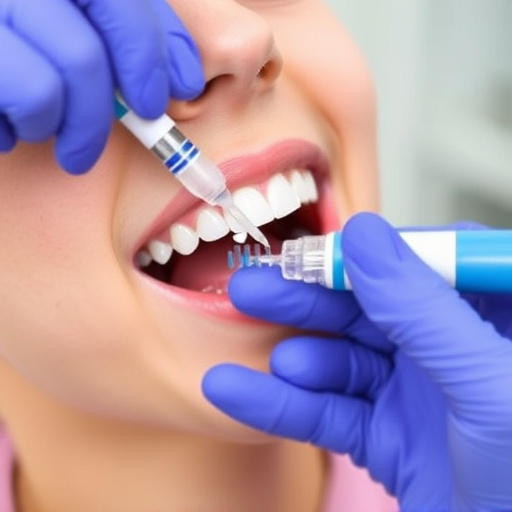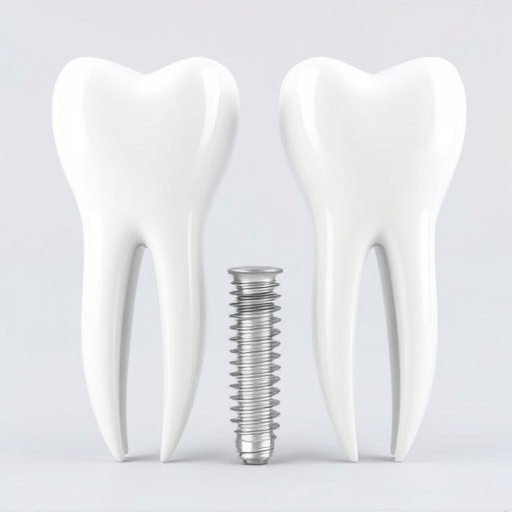Antibiotic therapy treatment is a versatile tool for combating bacterial infections and plays a key role in preventive dentistry. To minimize infection spread during treatment, focus on hand hygiene, environmental disinfection, patient education, and timely follow-ups. Adhering to evidence-based protocols, including tailored dosing and integrating dental practices, enhances the effectiveness of antibiotic therapy for comprehensive systemic and oral health care.
Antibiotic therapy treatment is a powerful tool in the global fight against infectious diseases. By understanding the basics of how antibiotics work and implementing effective strategies, we can significantly prevent infection spread. This article delves into the core principles of antibiotic therapy, exploring key strategies to enhance its efficacy and ensure optimal results in various healthcare settings.
- Understanding Antibiotic Therapy Basics
- Key Strategies to Prevent Infection Spread
- Effective Implementation for Optimal Results
Understanding Antibiotic Therapy Basics

Antibiotic therapy treatment is a powerful tool in medicine, designed to combat bacterial infections and prevent their further spread. At its core, this therapy involves the use of antibiotics, which are medications specifically targeted at killing or inhibiting the growth of bacteria. Understanding how this works is crucial for effective disease management. Antibiotics function by interfering with essential processes within bacterial cells, such as disrupting their cell walls or hindering protein synthesis, ultimately leading to bacterial death.
While commonly associated with fighting infections in the body, antibiotic therapy treatment extends beyond direct medical applications. For instance, it plays a significant role in preventive dentistry, especially during procedures like wisdom tooth removal or teeth cleaning. Here, antibiotics are used to reduce the risk of post-operative infections, showcasing how this basic therapy can be tailored to specific needs and body parts.
Key Strategies to Prevent Infection Spread

Preventing infection spread is a multifaceted approach when it comes to antibiotic therapy treatment. One key strategy involves meticulous hand hygiene and environmental disinfection, especially in healthcare settings. This includes regular cleaning and sanitization of surfaces, equipment, and instruments used during dental procedures like wisdom tooth removal or tooth extractions to minimize the risk of cross-contamination.
Additionally, proper patient management is vital. Healthcare providers should educate patients on post-treatment care, particularly after tooth repair procedures. This education encompasses promoting good oral hygiene practices, using prescribed antibiotics appropriately as per the dentist’s guidance, and recognizing signs of potential infection. Timely follow-up visits are crucial to monitor healing progress and intervene early if complications arise.
Effective Implementation for Optimal Results

For optimal results from antibiotic therapy treatment aimed at preventing infection spread, careful and effective implementation is crucial. This involves adhering to evidence-based protocols for administering antibiotics, ensuring proper dosing and duration based on individual patient needs. Healthcare professionals play a pivotal role in guiding patients throughout the course of treatment, monitoring for potential side effects and adjusting regimens as necessary.
Integrating antibiotic therapy with complementary dental practices such as restorative dentistry and cosmetic dentistry, alongside regular dental cleanings, can significantly enhance its effectiveness. These measures collectively work to maintain oral health, curb the development of infections, and prevent their propagation. By combining targeted antibiotic treatments with robust oral hygiene routines, healthcare providers can offer comprehensive care that supports both systemic and dental well-being.
Antibiotic therapy treatment is a powerful tool in preventing infection spread, but its effective implementation hinges on understanding basic principles and key strategies. By embracing these practices, healthcare professionals can optimize results while ensuring the responsible use of antibiotics to preserve their effectiveness for future generations.














